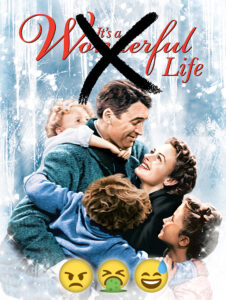 By Natalie Rivera
By Natalie Rivera
I HATE the movie It’s a Wonderful Life. There, I said it. This is NOT a popular sentiment during the Christmas season. Don’t get me wrong, when I’ve watched it, I have felt moved and cried at the end, but I also would find myself feeling resentful and angry in the couple hours following the movie. I could sense it was triggering me somehow.
The third (and last) time I watched it a few years, ago, it hit me; for recovering people-pleasers like me, this movie is like a shame-shit-storm. It perpetuates an unhealthy cultural norm that tells us that our value comes from the ways in which we sacrifice ourselves for others. It’s bullshit.
I had never seen the 1946 film until I was in my mid-30’s. While I watched, I could viscerally feel the main character George Bailey’s frustration and desperation, feeling like the weight of the world was on his shoulders. Bailey never got a chance to fulfill his lifelong dreams of leaving his small town, Bedford Falls, traveling the world, and exploring his talents as an architect.
Instead, he took over his father’s Building and Loan business out of a sense of obligation, in order to prevent a greedy and oppressive businessman in their community from taking away the ability of poor townspeople to afford homes for their families. While his younger brother attended college, joined the military and took a job elsewhere, instead of helping run the business as promised, George was trapped living a life that wasn’t his.
While he loved his wife and children dearly and cared for his community, he was riddled with anger, disappointment and resentment. Despite many years of self-sacrifice George had never lost that deep inner calling that his life was meant to be more.
On Christmas eve, George’s uncle, who works with him at the loan company, lost an envelope with $8,000 (over $100,000 today) in it, as he was on the way to deposit it at the bank. In a fit of heartbreak and feeling as though he has failed himself, his family, and the town, George decides to commit suicide. In fact, he wishes he had never been born. His death would give his family a life insurance policy that would save them.
After hearing the prayers of various friends and family of George, an angel-in-training named Clarence, who hasn’t earned his wings yet, falls to Earth to help George change his mind about wanting to die. He does this by showing George the how his family and community would be today if he had never existed.
The rest of the movie is a long guilt trip and dream-shaming that encourages enabling, self-sacrifice, and obligation. Its intention is to show George how meaningful his life has been, despite having never been able to live his dreams.
I am all for looking for the silver lining. I deeply believe that our blessings are often found within our curses. I also believe in being grateful for what you do have, even when what you wanted didn’t pan out. But the subtle way shame is sewn into this story is total crap. It’s a cultural attack on dreaming, fulfilling one’s purpose, and drawing healthy boundaries. George is encouraged to accept the consolation prize and appreciate that things could have, frankly, been worse.
But it doesn’t stop there; it leaves you feeling like there was something wrong with George for dreaming and, worse, for being disappointed and angry about how things turned out. But it isn’t just the message about discouraging fanciful dreams or that wanting something more for oneself is selfish that bothers me, it is that the story could have been much more empowering and heart-warming if George had been encouraged to go for his dreams rather than feeling responsible for other people’s lives. If he set the example of how to stand up for himself so that others could follow. If he showed them how to make the hard decisions so they could do so in their own lives.
And so, below I have summarized the story-line of the movie and added my own “empowering remix” showing how I would change it.
|
Original Version |
Empowering Remix |
|
Ever since childhood, George Bailey saw big things for himself, including traveling the world, planning cities, and building skyscrapers. |
This is great, but I would add… Coming from a family in the building and loan industry, his father was proud of young George’s dreams and encouraged him to one day create a name for himself, for his family, on a larger scale. |
|
At age 12, George’s younger brother Harry fell through the ice on the neighborhood pond. George jumped in and saved his brother and suffered with a lifelong ear injury and loss of hearing in his left ear as a result. |
Unchanged. |
|
George worked part time for the owner of the local drug store. One day, the pharmacist, who was intoxicated on the job due to mourning the recent death of his son, made a potentially fatal error fulfilling a prescription. George saw the error and corrected and ended up being beaten by the pharmacist as a result, until he could explain the mistake. The pharmacist was grateful for George’s actions to save him and the customer. |
Unchanged. |
|
George saved money for his dreams of going to travel the world for several months and then attending college. His brother plans to take over the family business when he graduates high school. Just before George plans to leave, his father has a stroke, so he delays his travels to take over for several months. Potter, the wealthy businessman who owned much of the company’s shares, as well as most of the housing in town (for which he charged exorbitant rent), threatened to liquidate the company. George plead with the board to keep the business open, and they agreed on one condition—that George take over the business. Wanting to prevent Potter from ruining the town, George gave his college money to Harry with the agreement that after Harry graduated college, he would take over the business from George.
|
Both George’s dreams and his commitment to doing what is best for his community are admirable. What I would add here is that there are other potential alternatives that are not addressed. To start, George could have been honest with himself and his family and colleagues about his desires and intentions. He could have negotiated with the board to give more of his shares to other board members, who would then take on more responsibility. He could have also agreed to groom another upstanding community member to take over the day-to-day role of running the business.
My point is that he was too quick to just accept the circumstance others were trying to push him into. It is hard to have these conversations, however when we do not stand up for ourselves or search for solutions, it is too easy to succumb to the pressure and desires of others. As a kind-hearted people pleasing type, George fell into the trap repeatedly.
However, despite my dislike for ease at which George gave up his own desires here, the plan for a further delay of his goals is reasonable considering the circumstances. Waiting for Harry to return gave George the satisfaction of knowing he was making a contribution to his community and also keeping the hope for his dreams alive. |
|
When Harry returns from college he has married and announces a great job offer that he received from his new father-in-law. He offers to give up the job to take over the Building and Loan from George, but George doesn’t want to stand in Harry’s way, so he tells him to take the job. |
This is another example of where communication and honesty are important, as well as believing it is okay to value your own desires. There is nothing wrong with George’s dreams of going to college or traveling or wanting to be an architect in the city.
However, either the culture around him or his own beliefs or both caused George to downgrade his dreams—the ones he had for his entire life—as being unimportant. When his brother had a new job opportunity come up—one he had never even thought of, let alone dreamed of and planned for his entire life—George valued his brother’s job more than his own life. It was not an act of support and kindness, it was an act of cowardice. Even his brother knew how much George’s dreams meant to him, which is why he offered to give up the job to take over the company, which was the plan after all. But George didn’t value himself enough to say “yes” to the offer.
This was the one true mistake that George made. This is where the entire storyline unravels for me.
The story would have been better if George expressed his passion for his dreams for himself and that he had put aside his desires for several years in order to support his community and his brother, but now it is time for him to keep his commitment to himself.
The story would have been better if after George’s submission to staying behind while Harry took the job, Harry valued his brother enough to reply back, “No George, I insist. I know this is a good job opportunity, but the truth is that I have had a wonderful experience in college and meeting my wife because of what you did for me, for us all, and now it’s your turn.”
The story would have been better if the entire community then celebrated George’s departure for college and travel, expressing their admiration both for his sacrifices and for his commitment to his dreams, thanking him for all he has done and celebrating him for being an inspiration to them all. |
|
The story continues with George running the Building and Loan while his brother takes the job and later becomes a Navy pilot in World War II. George gets married and is about to go on their honeymoon, but there is a run on the bank and they sacrifice their $2,000 honeymoon savings to keep the business solvent.
On Christmas Eve, the town welcomes Harry home from the service as a hero. Billy, George’s uncle that works with him at the business, goes to deposit $8,000 and accidentally folds the envelope into a newspaper, which he inadvertently hands to Potter, who finds the envelope but says nothing. Billy, distraught, returns to the party and tells George hat happened. Knowing the potential for scandal and ruin from the loss, George becomes enraged and retraces Billy’s steps, to no avail.
In desperation, he approaches Potter and asks for a loan, offering his insurance policy as collateral. Potter tells George his is worth more dead than alive and calls the police to come arrest George for misappropriation of funds.
George flees, gets drunk, and prays in vain for help. He runs to a nearby bridge with intent to jump off to take his life, which is when Clarence the angel shows up and dives into the river, triggering George to leap into the icy water to rescue him. |
Humph. |
|
George tells Clarence that he wishes he had never been born, so Clarence spends the rest of the movie showing George what would have come of his family, friends, and town had he never existed before.
Harry would have died in the frozen pond.
The pharmacist would have been arrested for his negligence and the patient would have been harmed or killed by the prescription mistake.
Potter would have taken over the Building and Loan and ruined the own with his high prices and negative influences. |
This sort of black-or-white thinking is another problem with the storyline. There are not only two options—George having the life he has lived or George never existing. It is true had he never existed he would not have been there to help those he helped. It is possible things could have turned out worse for the town due to Potter’s influence. However, even if George had not ever existed, it does not mean things would have necessarily turned out so horrible.
It is possible someone else may have saved Harry in the ice. If no one saved him, of course it would have been a great loss, but that loss may have become a driving force for their parents to value life in a new way. It could have inspired them to become advocates for ice safety.
It is possible the pharmacist may have made his mistake without George being there to stop him. But there are many times people make such mistakes when no one is around to stop them. That does not mean that the mistake is somehow the fault of the person who was not there to stop them. It is not everyone else’s responsibility. Had George taken a different job that summer, perhaps as an apprentice to an architect in the city, and not been there to see the pharmacist’s error, would it have been George’s fault?
And yes, without George there to save the Building and Loan company, Potter may have closed it and run the community into the ground. But it is also possible that other family members or friends or community people may have stepped up to the plate and fought to keep the business open. People may have had to stand up, together, against Potter and demand fair housing prices. The act of having to express their desires, needs and values and the necessity to work together as a community may have given them all a greater sense of pride and accomplishment. Instead of relying on a single man to “save them” they would have taken responsibility for their own lives and their town. |
|
After seeing the horrible outcomes of the lives of those he cared about with his absence, the movie closes with George eagerly returning to his family and life, grateful for all the ways his life made a difference.
When he returns, he finds that the townspeople are all lining up to donate money to cover the missing $8,000 and then some. His brother toasts George as “the richest man in town”. George finds a note from Clarence that says “no man is a failure who has friends” and just at that moment, a bell on the Christmas tree rings. Georges young daughter tells him that when a bell rings that means an angel has earned his wings. George says “attaboy Clarence” and smiles.
The film ends with George and his family and friends singing Auld Lang Syne. |
It’s beautiful and touching. I get it.
But it’s based on an unrealistic either-or scenario (mentioned above) and it misses the point that there were many other points within the story in which George could have made a different decision that would have changed the outcome.
There were many ways others could have contributed to what was needed in order to take unreasonable burden off George.
It didn’t have to be this way. |
I would have liked to see Clarence take George on a journey back in time, not to see what negative things would have happened if he had never been born but instead show him the wonderful things that could have happened if he had not given up on his dreams.
Even if he delayed his travels and college to support his father’s business, he could have made the decision to go when Harry returned. Doing so would have opened up new doors for him and his family. His stories of the big, wide world out there would have planted dreams in the minds of children back in his small hometown, who too would have dreamed of one day seeing the world.
He could have created innovative new designs for towns and buildings that had positive impacts on people’s lives. He could have used his own success and what he learned along his journey to help his community back home, too. He could have been a role model to every life he touched, including the millions who have watched his story unfold year after year as they sit down to watch his life unfold around Christmas time.
Parents could have seen the sparkle in the eyes of their children who were being shown that it is okay to have big dreams, that life is meant to be lived. It could have sparked conversations about what it means to be both a supportive family member and friend and also value your own growth and potential.
I don’t know how the story would have ended if Clarence had taken George back in time to see everything he could have been. I have a feeling it wouldn’t have helped his suicidal ideation in the slightest. In fact, I am sure it would make for a terrible movie. I wouldn’t want to rescript this film in this way. What I would want is to rescript our own thoughts and beliefs that tell us that we are supposed to not only sacrifice ourselves, like is shown in this movie, but celebrate it too.
The story of It’s a Wonderful Life isn’t what needs to be changed, it is our cultural shaming of dreams and adoration of martyrs. It really is a wonderful life, even though it rarely turns out according to plan. There is value in learning to appreciate the blessings found within the curses. But there is also value in celebrating the hard-won victories that come only when we make the decision to speak up, commit to fulfilling our potential, and find a healthy balance between supporting others and honoring ourselves.
The film ends on New Year’s Eve, as George boards the train into the city to begin college and travel the world. The family and friends, who he has been there for throughout his life, now come to support him as he launches into his new adventure. They line the tracks and wave as they all sing Auld Lang Syne. Clarence watches from above, as he tries out his new wings over the skies of Bedford Falls. He watches as George waves goodbye to the crowd, knowing deeply that he has both made a meaningful contribution of his time and energy to those he loves and also remained committed to his own dreams.
Attaboy George.
Tired of living everyone else’s dreams?
Ready to get clear about WHAT YOU REALLY WANT and give yourself permission to GO FOR IT?
Then we invite you to check out our self-paced course about Achieving Your Goals and Dreams! Click below and save 70%!
Ready to change your definition of HAPPINESS?
Stop living on a treadmill going nowhere, basing your life decision on what other people believe you “should” do!
Learn what creates TRUE and lasting happiness for YOU, as well as strategies for a truly FULFILLING life. Click below and save 70%!







